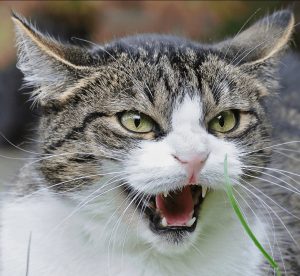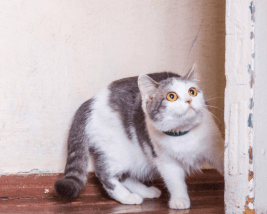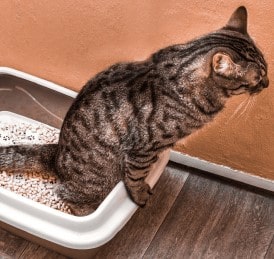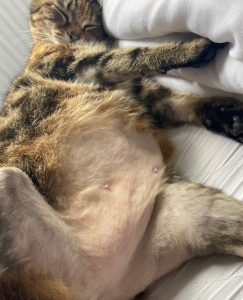Cats are sensitive animals, and small changes in their environment can trigger stress. Stress can affect cats of any age, breed, or sex. Behavioural changes are often the first sign of stress and can be sudden in onset or may develop more gradually.
Cats are very good at hiding when they are in pain or stressed. Symptoms of stress are often subtle and hard to spot. It’s important to contact your vet with any changes in your cat’s behaviour.
Stress can lead to emotional and physical illness. One major physical illness related to stress is urinary blockages in male cats. This is a life-threatening emergency and needs to be treated immediately.
Overview
What is stress in cats?
Stress is a common problem in cats and can appear as changes in their behaviour and physical health. The 2022 PDSA animal wellbeing survey shows that 44% of owners report their cats were showing signs of stress.
For a happy and healthy life, cats need several key resources
- Access to food, water, a toilet area, a scratching area, a high perch, a play area, and a resting or sleeping area.
- If these resources are not available, this can lead to them becoming stressed.
- This is especially important in multi-cat households. The general rule to follow is one resource per cat plus one extra.
- Cat owners need to make sure that there are enough resources for their cat(s) and that the resources are easily accessible to them.

Our Joii team are available 24 hours a day, call us now if you have any concerns with your cat.
What can cause stress in cats?
Cats are all different, and some are more sensitive to certain changes than others.
Lack of key resources
- Food and water bowls too close together or too close to the litter tray
- Litter tray not cleaned regularly, changing the type or litter or tray being too small.
- Not enough litter trays, food, or water bowls for the number of cats in the household
- Food and water bowls or litter trays in busy or noisy areas
- No access to a “safe place” somewhere to hide
- No scratching post
- Boredom, not enough mental or physical stimulation
Environment changes
- Moving their bed, food/water bowls, or litter tray to a new area
- Moving home, building work, re-decorating, or new furniture
- Any change in the routine, such as staying at home more than normal, someone moving out, or going on holiday
- People visiting or a new baby in the home
- Fireworks or unexpected loud noises
- Travelling in the car
- Trips to the vets
Social
- Inappropriate handling
- Punishment: never punish your cat. This can lead to the worsening of behavioural problems.
- Introducing new pets to the house.
- Living in a multi-cat household: some cats prefer to live alone.
- Lots of cats in the neighbourhood, especially those trespassing in your garden.
Medical Conditions
- Any medical condition, illness, or injury can cause stress in cats. It is more with long-term disease and pain, such as kidney disease or Arthritis.
Any changes in your cat’s environment can lead to stress. It’s best to anticipate and try to reduce this in plenty of time.
Symptoms
How to tell if your cat is stressed
Stress in cats can lead to emotional and physical symptoms.
Behavioural signs of stress
- Scratching the furniture
- Passing urine or faeces outside of the litter tray
- Spraying around the house: squirting urine horizontally – tail usually quivers
- Aggression toward other animals or people
- Hiding away or becoming withdrawn
- Demanding more attention or affection
- Meowing excessively or pacing around
- Excessive grooming
- Increased sensitivity to touch, noise, or movements
Certain body language
- Crouching or not moving
- Tail close to the body
- Arching back
- Ears flat and back
- Wide eyes and large pupils
- Licking lips or swallowing
- Hissing, spitting, or growling



Physical health
- Eating and drinking less or more than normal
- Vomiting or diarrhoea
- Poor coat condition: scruffy or matted
- Hair loss (alopecia) and skin sores
- Weight loss
- Runny eyes and nose
- Eating non-food items, also called PICA
- Low energy (lethargy), sleeping more than normal
- Blood in urine
- Squatting, painful or more frequent urination
- Respiratory signs due to asthma
Risk
Are some cats more at risk of stress than others?
Cats of any age, breed, and sex can become stressed. Like humans, cats are all individuals and react differently to changes in routine.
However, some risk factors that can lead to stress include
- Pregnant cats that are stressed or have incorrect nutrition: the litter will be at a higher risk of developing stress.
- A lack of socialisation as a kitten can lead to fear-related problems in the future.
- Rescue cats with pre-existing issues
- Multi-cat households or busy homes
- Underlying diseases, such as arthritis
- Male, indoor, and obese cats are more likely to develop stress cystitis.
- Older cats are more at risk of age-related insecurity: this often appears as excessive noise during the night and house soiling.
Diagnosis
How is stress diagnosed in cats
With any change in behaviour, sudden or gradual, it is best to contact your vet. This is especially urgent if there is physical illness present. Your vet will usually start by investigating potential medical causes. This may include
- A clinical examination to check for any abnormalities, including pain
- Blood tests
- Urine tests
- Skin tests, such as a biopsy
- Imaging: X-rays or ultrasound
Certain medical conditions can occur or worsen as a result of stress
- Overgrooming and skin problems
- Urinary issues: Stress or Interstitial Cystitis
- Cat flu
- Asthma
Further tests may be needed if your cat has these symptoms.


Once medical conditions have been investigated, the next step is to address behavioural causes. It’s best to speak with a behavioural specialist to help identify underlying causes. They will create a specific plan for your cat’s individual needs.
Behaviour specialists
- Referral to a behavioural specialist is always beneficial, especially if aggression is involved.
- When looking for a behaviourist, check their accreditations. It is important to find someone suitably qualified who uses ethical and up-to-date techniques.
- Your vet will usually be able to help find a suitable behaviourist, as some only work by referral. See the following organisations for more information about behaviour specialists:
ABTC (Animal Behaviour and Training Council) is a regulatory body that sets and maintains standards for the profession and has a national register for appropriately qualified animal trainers and behaviourists: https://abtc.org.uk/practitioners/?_abtc_role=clinical-animal-behaviourist
CCAB (Certified Clinical Animal Behaviourist) – an accreditation scheme by the ASAB ( association for the study of animal behaviour): https://www.asab.org/ccab-register
FAB (Fellowship of Animal Behaviour Clinicians) has a list of certified members and promotes high ethical standards and up-to-date techniques: https://fabclinicians.org/find-a-behaviourist/
APBC (Association of Pet Behaviour Counsellors) is a network of experienced and qualified counsellors: https://www.apbc.org.uk/find-an-APBC-member/
Vet treatment
What’s the treatment for stress in cats?
Treatment for stress in cats will depend on whether there are any underlying medical concerns.
Treatment of underlying medical conditions
Skin disease may require:
- Antibiotics: may be oral, cream, or shampoos
- Anti-itch medications
- Parasite preventatives
- Food trials
Urinary tract disease may need:
- Pain relief, anti-inflammatory medication
- Antibiotics if infection present
- Special food for crystals or obesity if present
- In the case of male cat urinary blockages: emergency hospitalisation for catheterisation, fluids, and pain relief.
Cat flu may require:
- Anti-inflammatory medication
- Eye drops
- Antibiotics
Treatment of behavioural problems
Usually involves an adaptation plan for at home together with specific behavioural medications.
- Finding the underlying cause(s) and adapting to end or reduce this. It may be necessary to seek the help of a behavioural specialist to do this.
- Some cats may need prescription medication to help reduce behavioural problems, such as sedatives or anti-anxiety medications.
Home treatment
How to help at home if your cat has stress
There are ways to help at home if your cat is stressed or you expect changes in the routine or environment. A combination of calming supplements, diffusers, and environmental changes can help.
Calming supplements and diffusers
- Pheromone adapters, sprays, and wipes. These products release a soothing pheromone into the air that can help reduce stress levels. They only have effects on pets, not humans.
- Calming supplements. These contain natural ingredients that can help ease stress and anxiety.
- Bladder supplements can be useful when cystitis is also present.
Always seek advice from a professional to find the underlying cause of stress. These products should be used alongside a behavioural modification plan. It may take several weeks before you see any improvement. Our Joii team are available 24 hours a day for advice.
Environment
- Make sure to clean any soiled areas of the house with an enzymatic cleaner
- Follow the tips below on how to prevent stress
Prevention
Tips on how to prevent stress in cats
Make sure your cat has all the key resources they need for a happy and healthy life:
- Keep the litter tray clean.
- Offer options for litter trays, such as one with a lid and different types of litter.
- Make sure the food and water bowls are separated from each other and are both far from the litter tray. Keep these resources away from busy or noisy areas of the house.
- Provide multiple options for drinking water, such as a bowl and a fountain, in separate areas.
- For multi-cat households, at least one resource per cat plus an extra. Feeding separately can also help.
- Provide a safe space for them to hide in the house: somewhere high, warm, and dark is perfect.
- For elderly or unwell cats, make sure these resources are easily accessible.
Keep a consistent routine for your cat, such as feeding at the same time every day.
Provide adequate playtime for your cat for both mental and physical stimulation. Use puzzle toys or hide treats for them to find.
Anticipate any changes, such as moving house, and take steps in advance to reduce this stress on your cat. Use a pheromone diffuser or book a stay for them at a cattery while there is work in the house.
Gradually introduce new pets into the household.
Pay attention to your cat’s body language. Never restrain your cat, and give them space. Some cats prefer not to be touched or patted. Let them come to you. Some cats love attention but try to avoid them becoming over-attached.
If possible, install a cat flap, ideally with a microchip sensor, for outdoor cats so they can come and go as they want.
Make sure to get your cat checked over regularly, at least 1-2 times a year, by your local vet to check for any illnesses.
When to worry
When you should be worried about a cat with stress
Seek help from your local vet practice:
- Immediately if your male cat has any difficulties passing urine
- If there is any sudden or gradual change in your cat’s behaviour
- If your cat is losing weight
Call us and speak to one of our Joii Vets if
- You think your cat may be stressed.
- You are anticipating changes in your cat’s routine and want to know how to prevent stress for your cat.
- You want to know more about different supplements or diffusers to help with stress.
- You need advice about what toys or treats to use for mental and physical stimulation for your cat.
- You are not sure what key resources your cat needs.
- You have any questions about finding an appropriate behaviour specialist.
We offer pet well-being and behavioural services through the Joii App – call our nurse or vet team to find out more!








